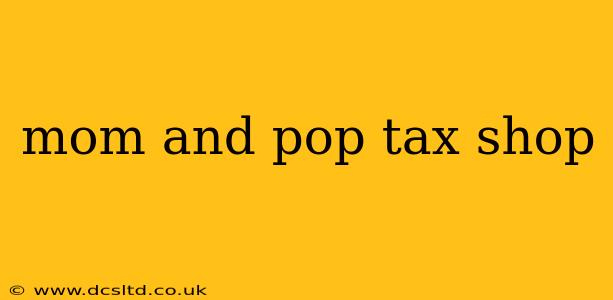The landscape of tax preparation is diverse, ranging from large national chains to smaller, independent firms often referred to as "mom and pop" tax shops. These smaller businesses play a significant role in many communities, offering personalized service and a local touch that can be appealing to many taxpayers. This guide will explore the advantages and disadvantages of using a mom and pop tax shop, addressing common questions and concerns.
What are the advantages of using a mom and pop tax shop?
One of the primary benefits of choosing a mom and pop tax shop is the personalized service they typically offer. Unlike larger chains, these businesses often have a smaller client base, allowing them to dedicate more time and attention to each individual's tax situation. This personalized approach can be especially valuable for taxpayers with complex financial situations or those who prefer a more hands-on experience. The owners often have deep roots in the community, fostering a sense of trust and familiarity. This personal connection can make the often stressful tax season feel more manageable.
Furthermore, mom and pop tax shops frequently offer competitive pricing. While costs can vary, they may offer lower fees than larger chains, particularly for simpler tax returns. This affordability can be a significant factor for taxpayers on a budget.
What are the disadvantages of using a mom and pop tax shop?
While personalized service and competitive pricing are significant advantages, there are some potential drawbacks to consider. Smaller firms may have limited resources and expertise compared to larger chains. They might not have the same access to advanced software or specialized knowledge to handle highly complex tax situations, such as international income or significant business investments. This limitation could lead to errors or inefficiencies in the tax preparation process.
Another potential concern is the potential lack of insurance or bonding. While reputable mom and pop shops will have necessary insurance and bonding, it's crucial to verify this information before engaging their services. This protection safeguards taxpayers against potential errors or misconduct. Larger firms typically have robust insurance and bonding policies in place.
Are mom and pop tax shops as qualified as larger firms?
The qualification of a tax preparer, regardless of the size of the business, hinges on their credentials and experience. Many mom and pop shops employ CPAs (Certified Public Accountants) or Enrolled Agents (EAs), who possess significant expertise in tax law. However, it's essential to verify the credentials of the preparer before hiring them. Ask about their qualifications and experience to ensure they are adequately equipped to handle your specific tax needs. Don't hesitate to ask for references or check online reviews.
What should I look for when choosing a mom and pop tax shop?
Selecting the right tax professional, regardless of the business size, is crucial. Look for a shop with a good reputation, positive online reviews, and a demonstrable understanding of tax laws. Confirm their credentials and verify that they are properly insured and bonded. A face-to-face meeting allows you to assess their communication style and comfort level in discussing complex tax matters.
How do I find a reputable mom and pop tax shop?
Finding a trustworthy mom and pop tax shop often involves word-of-mouth referrals from friends, family, or neighbors. Online reviews on sites like Yelp or Google My Business can also provide valuable insights into the quality of service and customer experiences. Checking the Better Business Bureau (BBB) for complaints or ratings can further aid in your decision-making process.
In conclusion, mom and pop tax shops can offer personalized service and potentially lower costs. However, it’s essential to carefully evaluate their qualifications, insurance, and resources to ensure they are the right fit for your tax needs. Thorough research and due diligence are paramount in making an informed decision.
